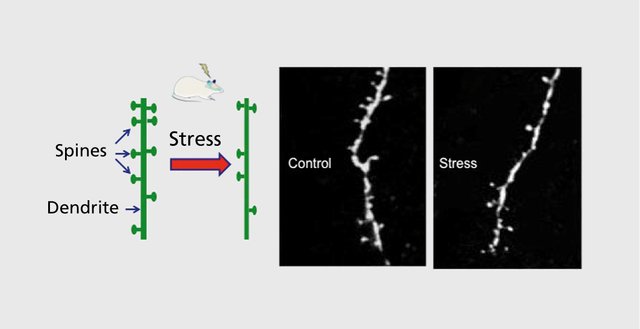STRESS: ENEMY OF OUR BRAIN

Nowadays is well known that the brain is not a rigid and fixed organ as it was thought before, but it is on the contrary endowed with a particular plasticity. This particular property of our brain has allowed over the years to reach the conclusion that neurons during their life time undergo a modelling, from a functional and structural point of view, through interactions with the external environment.
Research on neuroplasticity in the adult brain has been strongly stimulated by the observation that neurons in the brain can die, for example, due to trauma or degenerative diseases, such as Parkinson's or Alzheimer's disease, but a very crucial role on the brain, and in particular on the brain plasticity, is played by the surrounding environment and by the experience; the brain, in fact, being affected by the environmental influence and actions performed by the individual during life, is able to change.
Unfortunalty, a strong external stimulus that induces several neuroplastic changes is stress.
Repeated or chronic stress causes a morphological variation of neurons, in different region of the brain. Probably the neuromorphological change on which we investigated more in depth is the regression, induced by stress, of the geometric length of the apical dendrites and spines of pyramidal neurons.
As we can see in this picture the dendrite and the spines of a control (healthy and non-stressed) patient have been compared with another one (particularly stressed) who shows a significant lower number in spines and a certain atrophy of the dendrite.

The atrophy of dendrites reduces the surface area of neurons and therefore decreases the number of synapses; there are drugs that stimulate neuroplasticity and which can prevent the atrophy of stress-induced dendrites in hippocampal’s function and structure. They are in fact able to block the effects caused by stress and indeed they promote neurogenesis in some brain region.
Moreover, stress can also mediate a decrease in neurogenesis and an increase in the level of glucocorticoids (cortisol).
Cortisol can bind to hippocampal neurons. It’s important to know that the hippocampus is the area that converts new experiences into memory. So this binding actually disrupts the memory-forming process. If stress continues, the synaptic regions deteriorate, making the impairment permanent. [1] The effects of stress on memory are, however, not limited to the formation of memories (i.e., memory encoding and consolidation) but affects also the memory retrieval. [2]
References
[1] https://www.psychologytoday.com/blog/memory-medic/201612/thwart-stress-effects-memory
[2] https://www.nature.com/articles/npjscilearn201611
Keep it up! waiting to see what else you'll post!
Thank you :)
Please begini the follow
I did :)
Please behind the follow
Congratulations @michelapalmisano! You received a personal award!
Click here to view your Board
Congratulations @michelapalmisano! You received a personal award!
You can view your badges on your Steem Board and compare to others on the Steem Ranking
Vote for @Steemitboard as a witness to get one more award and increased upvotes!